Reply To:
Name - Reply Comment
Last Updated : 2024-04-19 18:04:00
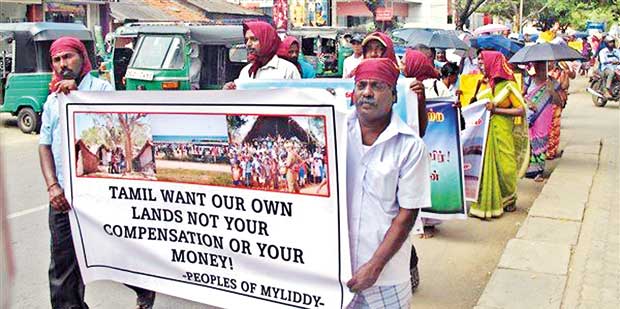 One of the key issues is land, as the military is occupying large chunks of land in the region
One of the key issues is land, as the military is occupying large chunks of land in the region
The current constitution of Sri Lanka does not contain judicially enforceable, economic, social and cultural rights, though they are very much a part of daily life. With the onset of the debate for a new constitution, the discourse for the inclusion of Economic, Social and Cultural (ESC) rights in the constitution has taken center stage. ESC rights include the right to education, housing and health. Though these rights are not constitutionalised people in the country have access to free healthcare  and education, which signifies that the state recognizes ESC rights. Hence the question emerges as to why constitutionalising ESC rights is so important and why certain groups oppose the constitutionalizing of these rights. Proponents of constitutionalizing these rights firmly maintain that ESC rights are equally important as their civil and political counterparts. In a panel discussion held recently on this theme the panel, which mainly included the Chairperson of the Human Rights Commission, the Secretary General of Amnesty International and the Executive Director of the Law and Society Trust, countered the arguments against constitutionalizing ESC rights, and highlighted the importance of guaranteeing these rights through the constitution and providing judicial remedy when they are breached.
and education, which signifies that the state recognizes ESC rights. Hence the question emerges as to why constitutionalising ESC rights is so important and why certain groups oppose the constitutionalizing of these rights. Proponents of constitutionalizing these rights firmly maintain that ESC rights are equally important as their civil and political counterparts. In a panel discussion held recently on this theme the panel, which mainly included the Chairperson of the Human Rights Commission, the Secretary General of Amnesty International and the Executive Director of the Law and Society Trust, countered the arguments against constitutionalizing ESC rights, and highlighted the importance of guaranteeing these rights through the constitution and providing judicial remedy when they are breached.
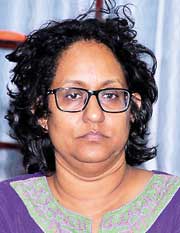 Dr. Harini Amarasuriya - Former member of the Public Representations Committee (PRC)
Dr. Harini Amarasuriya - Former member of the Public Representations Committee (PRC)Dr. Harini Amarasuriya, a former member of the Public Representation Committee (PRC), a senior lecturer at the Open University and the moderator for the day set the discussion in its context pointing out how despite the submissions to the PRC on ECS rights there was an ongoing debate on their inclusion. “It’s really interesting that the Public Representation Committee(PRC) received so many submissions asking for socio-economic rights to be constitutionalised, and equally interesting is the huge debate taking place after the report came out on this very issue. In a way, Sri Lanka has had a history of having socio-economic welfare systems in place, without it being necessarily in the constitution. So why in that context is there such a big demand coming up for the constitutionalising of socio-economic rights?” she said adding that the debate reflected the state of socio-economic well-being in our society. She further remarked that the response by the groups against the inclusion of socio-economic rights in the constitution reflected the huge divide within society on the very issue.
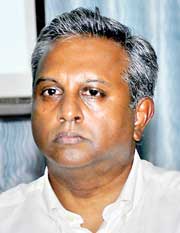 Salil Shetty- Secretary General of Amnesty International
Salil Shetty- Secretary General of Amnesty InternationalStating that the divide between civil political rights, and economic social rights was very artificial Salil Shetty, the Secretary General of Amnesty international said that from a global perspective the justiciability of ESC rights was fundamental in the effective implementation of the International Covenant Sri Lanka has ratified. “In the case of Sri Lanka you don’t have a just and equitable country, where no one is left behind, which is a mantra of the Sustainable development goals,” he said.
Commenting further on justiciability he pointed out that through the Convention on the Rights of the Child (CRC), the Committee on the Elimination of Discrimination against Women (CEDAW) and other covenants there has been much reinforcement of juticiability over the years.
“The constitution reform process here is really a great opportunity for ESC rights to be enforecable in a lasting and plural way. Internationally there are more and more constitutions integrating ESC rights into them. Nepal is a shining example of a constitution that is centered on guaranteeing the possibility of citizens seeking judicial redress,” he said.
Emphasizing on the necessity of a universal approach and enforceability he stressed on the importance of judicial remedy. Citing Right to Information he pointed out that there were instances where functioning institutions were essential to define minimum core obligations and state delivery.
Commenting on delivering mechanisms he said, “You can have all these judicial mechanisms in the constitution. But if you have totally ineffective delivery mechanisms and communities themselves don’t have any kind of control on the delivery, then they don’t have a voice.”
Remarking on resourcing on a sarcastic note he indicated how when the defence expenditure increased, resources appeared magically. “It’s also the same with capacity building. If the government doesn’t want to do something they’d say that they don’t have the technical capacity. Resource and capacity is as you can see very flexible concepts,” he added.
Shetty had just returned from spending few days in the North where he had visited several places such as Kilinochchi and Jaffna. He observed that people were still getting over the trauma of what took place during the last stages of the war. “One thing that struck me was that this conversation here can’t be disconnected with that discussion because most of the people we met were suffering from a range of issues. One of the key issues is land as the military is occupying large chunks of land in the region,” he pointed out.
He further pointed out that though transitional justice was a hard core civil and political rights question, for most of the people their main demand was less on transitional justice and more about land. “Their demands are about health, education and the basic economic, social and cultural rights. This proves the artificiality of this discussion and the meaningless of trying to separate these two kinds of rights. I hope Sri Lanka can become a model for a new way of looking at incorporating ESC rights into the transitional justice question as well,” he said.
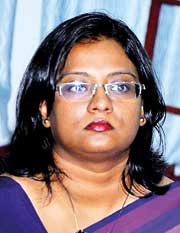 Dinushika Dissanayake - Executive Director of the Law & Society Trust
Dinushika Dissanayake - Executive Director of the Law & Society Trust
Dinushika Dissanayake, the Executive Director of the Law and Society Trust stressed that both the PRC report and the Subcommittee report showed how people across Sri Lanka –from the North, South, East and West - wanted economic, social and cultural rights guaranteed. “Guaranteeing ESC rights in the constitution is no longer an option. This is a false debate we are having. People want it. They very clearly ask for it,’ she said.
Elaborating further she referred to the life experience of a boy from Giradurukotte who had spoken at the launch of a briefing paper on CKDU by the Law and Society Trust the previous day. “He was a beneficiary of public education and entered the university. His father was a farmer and contracted CKDU. They couldn’t pay for his boarding in Colombo and his mother now works for a mono cropped plantation in the area done by a multinational company. His mother is also exposed to different types of chemicals. For me, this raised all types of complex issues about socio economic rights and where we place it.”
She pointed out that ESC rights could be included not only in the Bill of rights but also in other parts of the constitution, including the sharing of sovereignty and decision making over natural and national resources. “Sri Lanka has a rich history of provisioning for human rights and especially for economic and social rights since the 1940s, be it education or health. This has led to where we are today, in terms of the indexes and life expectancy,’ she said.
“Sri Lanka is also a democratic, socialist republic and this is not by accident. The thinking of the leftist government of 1972 and the fact that it was not removed in 1978 says a lot about the political ideology about our people and the country,” she added.
Speaking about the dangers of providing these rights without guaranteeing them, as is the case currently, Dissanayake pointed out that the systematic nature of these rights could be taken away at anytime. “LST and many other organizations were part of drafting a joint civil society shadow report. Some of the discussion around this was about how budget cuts on education and healthcare affects people. This is a lived reality of our people. In the 2017 budget Rs. 100 billion has been cut from education. Rs. 13 million has been cut from health. The Defence budget has gone up,” she said.
“When rights are only guaranteed through provisioning there are also disparities in how resources are allocated. For example, the National Education commissions report in 2014 tells us that 16% of primary schools in Sri Lanka didn’t have access to water. It also says that in terms of unsanitary facilities only 0.5% of schools did not have sanitation. But when you look deeper it shows that Colombo didn’t have 0.5%. while Mullaithivu did not have 37%.” Speaking about shared sovereignty she once again referred to the boy from Girandurukotte. “The land in that area has been given to a mono cropping Plantation Company. Some of these plantation companies leave without notice. Sometimes people are not paid salaries. This is frightening in terms of poverty indicators. What happens to women who are exposed to large doses of chemicals without any of the covering facilities that should be used when using these chemicals? What happens to them when they fall ill? We do have public health care. But how far does it go when you keep cutting the budget on health care?”
She added, “If you talk about absolute poverty in Sri Lanka it has reduced. In 2012 it was 6.7%. The joint shadow report discusses what is meant by absolute poverty. Is it Rs.135 per person a day? Can you live on Rs. 135? In 2016 the World Bank told us that 40% of Sri Lankans live on less than Rs. 225 a day. So when it comes to human dignity, our commitments on zero hunger and zero poverty where do we stand when the day of reckoning comes after years in terms of the Sustainable
Development Goals.”
“The women in Mullikulam, Mullaithivu and Kilinochchi are sitting on the streets with children sleeping on their laps asking for economic justice. And many of us are only concerned with certain parts of transitional justice,” she said.
“An independent judiciary that is capable of finding and directing on civil and political rights is also perfectly capable of finding and directing on economic, social and cultural rights. We have seen how restraint, independent judiciaries in South Africa, India and other places have not overburdened the state,” she said.
“Constitutions around the world have already moved on, have already guaranteed these rights. So why do we need to talk about this is also inexplicable. ESC rights cannot be compromised despite the popular theory that it can be compromised. Human dignity means just like the right not to be tortured we have the right to live,” she stressed.
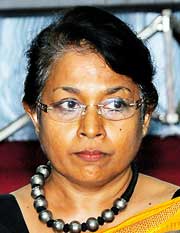 Deepika Udugama - Chairperson of the Human Rights Commission (HRC)
Deepika Udugama - Chairperson of the Human Rights Commission (HRC)Deepika Udugama, the Chairperson of the Human Rights Commission (HRC) said that ESC rights should be included in the constitution.“This is the third constitution we are living under since independence. It is not a secret that the constitutions of this country have not been a major part of our lives. We don’t appeal to the constitution of the country as our saviour, as our protector. It is to a very great extent a very peripheral document. Lawyers do take cases before the Supreme Court on fundamental rights. Human Rights Advocates refer to constitutional provisions of rights which champion rights of all of us. But in terms of the public imagination the constitution is not a central part of our life. I think the constitution building process is about making the constitution part of our public imagination. This is what is very important,” she said adding that the actual challenge laid in making the constitution a living part of public life.
Referring to the three generations of rights she said they were a product of cold war debates and discussions. “The first, second and third generation of rights are considered to be universally recognized human rights, although their development could have seen in the various generations emerge. I think what we need to recognize is not just the theoretical debates that took place in the United Nations and the world over, at a local level. I think there is nothing more important than analyzing these guarantees from our own life experiences.”
“Would it be possible for someone to argue that the right to food security and the right to clean drinking water are less important than the right to be free from arbitrary arrest? Could we have a dignified life without the right to healthcare and right to education?” she quizzed.
Stressing that ESC rights was about life experiences she pointed out that the PRC report clearly showed the aspirations of the people in relation to the various dimensions of rights. She argued that people did not want only their civil and political rights protected, but they also wanted other rights such as the access to healthcare, education, a clean environment etc ensured.
“You need to tag this debate to life experiences than the technicalities, because the technicalities can be painfully theoretical and really don’t do justice to life itself. After all, human rights are about life. Why do we need human rights? To live a good, dignified and free life. Often we are chided for being theoretical, too conceptual and conceptually vague and so on,” she said.
“Technicality also has a very practical dimension. Sri Lanka has recognized at an International level that economic and social rights are very important rights by ratifying the International Covenant on civil and political rights. That is also about good faith obligations- an obligation which recognizes that Sri Lanka is legally bound and that we should discharge our legal obligations in good faith,” she added.
She further pointed out that Sri Lanka is required to present the legal status of ESC rights at the United Nations Economic, Social and Cultural Rights Committee in November in Sri Lanka’s fifth periodic report.
Highlighting that this was the ideal opportunity to get a balanced bill of rights she said that as sovereignty lay in the people and as human rights were part of sovereignty of the people, all these rights must be protected in a democracy. “We also know that both sets of rights-if you categorize them as civil and political rights and economic, social and cultural rights- entail positive and negative obligations. For example, we are told, how could the judiciary require the state to provide a certain type of education to the public because that is going to entail a great degree of public expenditure, and that is not the role of the judiciary. In dealing with torture are we going to say that the obligation of the state is merely negative, that is to say, that the state should not torture and to stop at that?”
She added that the most important dimension in this respect was to practically provide training to the police about modern methods of investigation and provide the technology to engage in investigations without torture. “This sounds very simplistic, but it’s fundamentally a very important dimension of the fight against torture. This costs a lot of money,” she said.
“If you look at so many cases involving equality there are huge resource implications for the state. Does it mean to say that the state does not then provide interpretation for the equality clause on the basis that there are resource implications? That really is not the case. So this is about an ideological divide that has nothing to do with the arguments raised about resource implications or the role of the judiciary,” she said.
Speaking on the role of the judiciary and countering the argument of critics of justiciable ESC rights as to whether unelected judges can make decisions she pointed out how the common law tradition built bodies of jurisprudence through the judgments of unelected judges. “In the United States constitution there is judicial review of legislation through interpretation. In India the secular nature of the state was pronounced upon by the judiciary. This is the tradition in the common law system. So there is nothing new about it.”
“If Sri Lanka goes into the history books at this point as the country that turned its back on all these decades of development in the human rights field, I think its impact is going to be very serious. All the changes that the people of this country worked for will remain unfinished,” she remarked.

Add comment
Comments will be edited (grammar, spelling and slang) and authorized at the discretion of Daily Mirror online. The website also has the right not to publish selected comments.
Reply To:
Name - Reply Comment
On March 26, a couple arriving from Thailand was arrested with 88 live animal
According to villagers from Naula-Moragolla out of 105 families 80 can afford
Is the situation in Sri Lanka so grim that locals harbour hope that they coul
A recent post on social media revealed that three purple-faced langurs near t